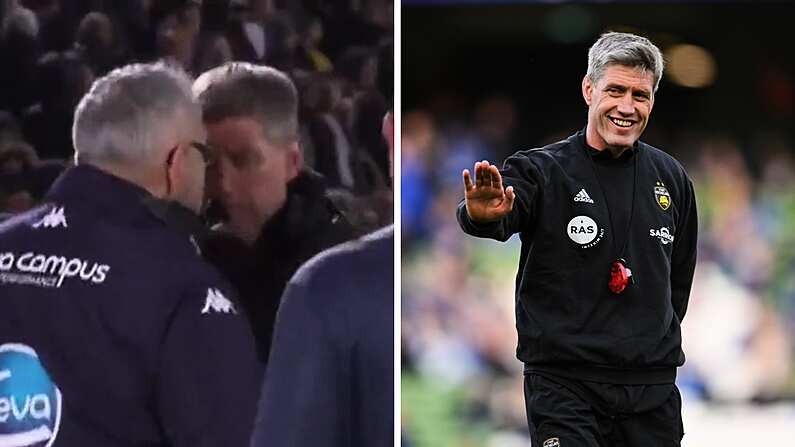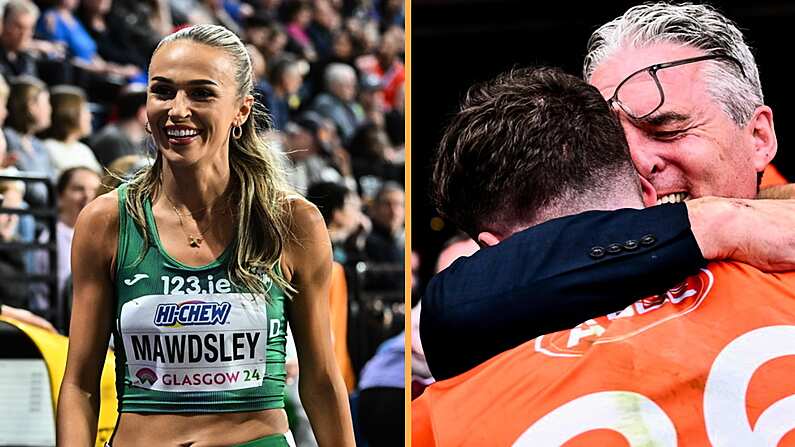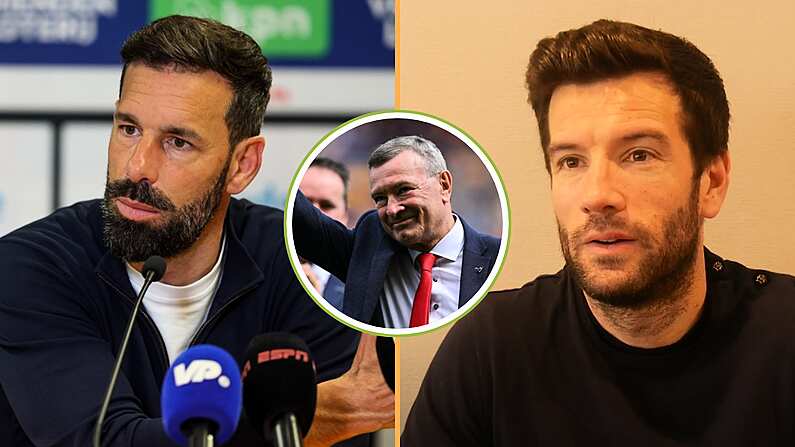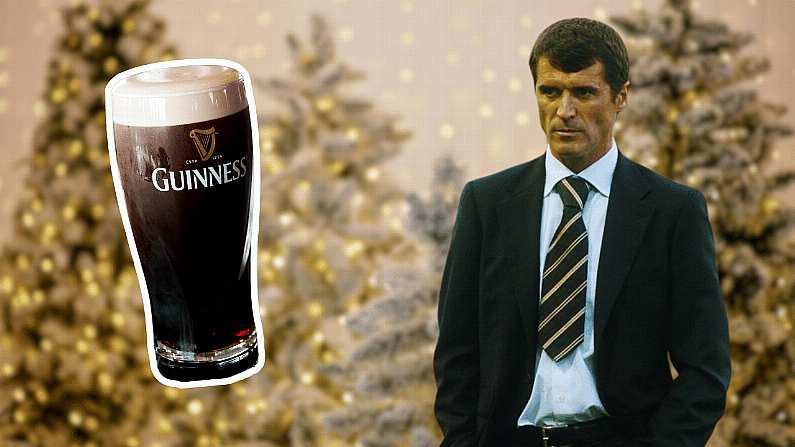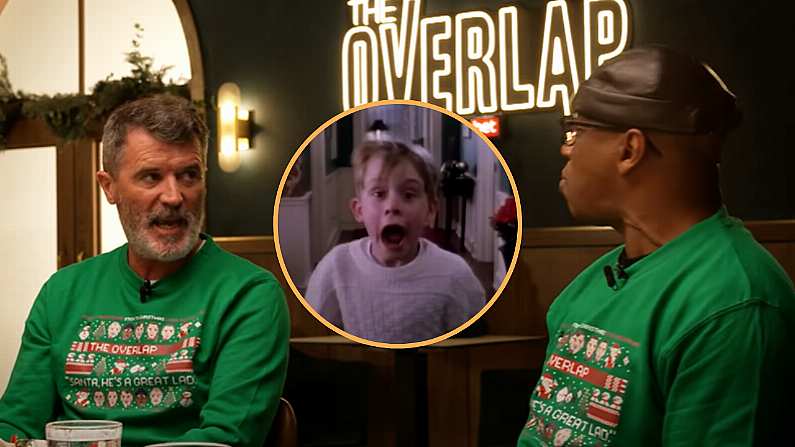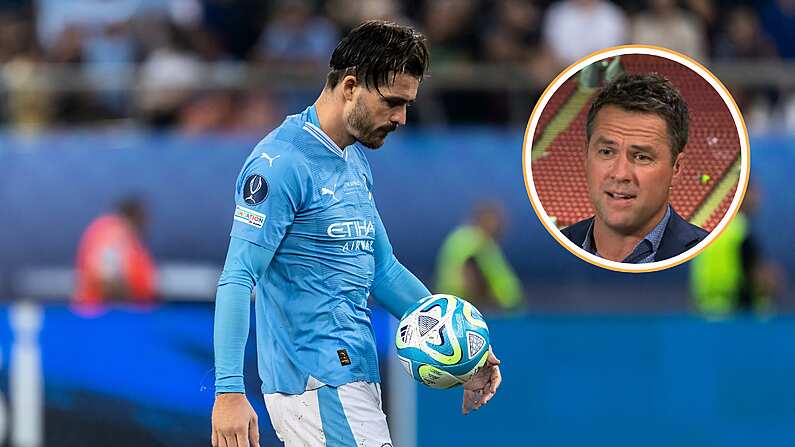Only once since he took the Liverpool job has Brendan Rodgers taken his guard down.
It was in an interview with Michael Calvin for the latter's book, Living On The Volcano, the Secrets of Surviving as a Football Manager. Rodgers was still the Liverpool manager at the time.
The interview features Rodgers' usual cloying schmaltz, telling Calvin of how he loved to run around the streets of Liverpool in the evening time, greeting "our people" when the "the doors are open and the dinners are on, and you can smell the mince cooking".
Calvin cuts him off at the word mince, however, and subsequently manages to probe beyond the Brendan Sheen.
As his professional career took off at Swansea and Liverpool, Rodgers tells Calvin that he has endured extreme personal strife:
I lost my mum. I lost my dad. I split up from the woman I loved for twenty-three years. I had a court case, two Old Bailey trials over six weeks with my son, who was charged with sexual assault, which was an absolute disgrace. Yet professionally, here [at Liverpool] and at Swansea, these have been the best four years of my life.
The biggest line comes a couple of pages later, when talking of how he would be considered a 'master-class manager' if he was foreign:
I've had to create a brand for myself around my philosophy, because I was never a big player.
It was the first public uncoupling of Brendan and Brand Brendan.
*****
Today marks a year to the day since Brendan Rodgers was sacked by Liverpool, following a 1-1 draw away to Everton. In truth, the decision should have been made four months earlier, after his Liverpool world collapsed upon itself in a 6-1 capitulation away to Stoke.
In the aftermath of this game, we saw the second separation of man and brand. In the post-game press conference, an ashen-faced Rodgers gazed downward: bereft of his famed positivity as he gave grave volume to what seemed the inevitable, admitting that if the owner wanted him to go, he would go.
https://youtu.be/cEP0SzosDM8
In the end, he stayed until October 4th.
Whereas his defence had never worked, Rodgers' failure to set-up an attack was a betrayal of the brand that had got him this far.
Not since Bill Shankly hoisted the club to the first division had Liverpool appointed a manager less-qualified than Rodgers. Even Roy Hodgson brought with him the backing of an influential slice of Fleet Street, and a CV that mistook longevity for aptitude.
Rodgers was appointed as Liverpool manager having impressed Fenway Sports Group with a 180-page dossier outlining his coaching methods and vision. In their halcyon days, Liverpool managers were promoted from within. Later, they were valued on success: Gerard Houllier and Rafa Benitez had trophies elsewhere to back themselves up.
Brendan Rodgers was the first Liverpool manager to be appointed on an idea.
From boot room to boardroom.
If he was to survive, the idea had to.
*****
There now exists a generation of football fans who filter their experiences through the potential for memes, and in this cauldron, Rodgers ultimately became mocked by his own echo. He became a prime target mainly because it was so easy: comments like 'I've always said, you can go for days without water, but not a minute without hope' attract easy cynicism.
At times he spoke with an overbearing sense of mawkishness: talking of 'making the people happy' and extending his arms above his head as if deliberately trying to give life to Anfield's statue of Bill Shankly. His positivity at times strayed beyond the cloying and just the plain deluded.
But this was all part of the idea. The idea had two strands: the emotional and the technical.
Rodgers also modelled himself as the tactical coach: he was the problem-solver, the guy committed to finding a system and a way of playing. While there was a perception that he was selling himself as the British Barcelona; a stubborn persistence to 4-3-3, possession and a wee man in the middle, the reality of Rodgers' vision was that he was the man who could coach something different, constantly stressing his fundamental belief that young British players were just as capable of passing the ball as well as continentals.
He sold difference rather than dogma.
Not that this should veneer be mistaken as masking a lack of substance. Here's the main thing: for a while, he did it.
The 4-3-3 was abandoned halfway through his first season when Daniel Sturridge and Phillippe Coutinho were signed, and his first season ended with a single defeat in 12 games, and that ran into what proved the peak: the 2013/14 season in which Liverpool almost won the league.
Many will say that he was made to look good by Luis Suarez, and this is partly true. But Suarez' goal record at Liverpool improved greatly under Rodgers ( 21 goals in 52 games pre-Rodgers, 61 in 81 thereafter) and Rodgers also managed to find a system that brought out the best in Suarez, Daniel Sturridge, Steven Gerrard, Raheem Sterling, Jordan Henderson and, to a slightly lesser extent, Phillippe Coutinho.
This was the technical success.
That success stirred Anfield to a level of noise and unity that hadn't been seen in nearly a decade, and Rodgers rode this wave with his unique positivity. Some will say that this is a no-brainer: why would you change a winning team, and risk checking the momentum of both players and fans?
Perhaps it is, but it is something predecessor Rafa Benitez didn't do. Benitez' cold analysis of each game allowed Anfield some of its greatest nights against superior opposition, but it also checked crucial momentum in the Premier League. In 2007, with Fernando Torres hitting the ground running and Steven Gerrard at his peak, Liverpool went into the international break with ten points from twelve, riding high after a 6-0 win against Derby.
In the first game back after this break, away to Portsmouth, Benitez left Gerrard and Torres on the bench, and Liverpool's momentum was greatly impeded. They drew two of their next three games, and were playing catch-up from thereon.
Rodgers, in contrast, hit on a winning formula, and while it was working, didn't change it.
The Rodgers Idea hit its apotheosis with a 3-2 win against Man City, at an Anfield dripping with emotion on the twenty-fifth anniversary of Hillsborough and on the cusp of a first league-title in 24 years.
It never went as high again.
*****
The infamous 2-0 defeat to Chelsea, in which Gerrard slipped, showed the limits of the Rodgers Idea. Liverpool needed seven points from nine to win the league, so a draw would have sufficed. Steven Gerrard admitted that, in the build-up, Liverpool were swept away by the rollercoaster.
Had Benitez been in charge, Liverpool would likely have played more cautiously. Had Benitez been in charge, Steven Gerrard would definitely have been substituted before the game's end. Following the first-half slip, Gerrard charged around the field acting the hero, taking a number of pot-shots from distance rather than playing passes to Suarez and Sturridge, remaining patient and trusting his side to break down Chelsea.
Gerrard had lost his head, and needed to be subbed. This level of cool detachment wasn't in the Rodgers Idea, however. It had helped Liverpool get that far, but it is the reason they went no further. That was the failing of the emotional part, and the technical failed soon after.
Following the sale of Luis Suarez, Rodgers was given an uneasy hodgepodge of players, totally different in style. Rodgers, as the man that could make things work, tried his best to combine them to strong effect - and briefly, he did: a 3-5-2 system midway through the following season yielded five wins in a row and a defensive improvement.
Rodgers was always careful to claim public credit for the transformation: a beguiling long-range Coutinho winner against Man City was explained in a Sky Sports by Rodgers as a direct result of his new system, having moved the Brazilian further infield.
But it fell apart at home to Manchester United, days after well-sourced newspaper stories spoke of how Rodgers had hit upon this new system during a long night of strife over tea and toast. Liverpool lost the next game, and Rodgers' reign never truly recovered.
It hit its nadir during the FA Cup semi-final against Aston Villa at Wembley, a game in which Liverpool's attack congealed into a blunt force, and Rodgers came across as a man desperately fiddling around, trying to diffuse a bomb: he changed the team's system four times during the game, leaving his players exceptionally confused against a team managed by Tim Sherwood.
As the final confirmation of confusion, Rodgers ended his Liverpool reign by accepting what he had rejected at the beginning: signing Christian Benteke after deciding Andy Carroll was ill-suited to his style of play. This was the move of a man who believed in his ability to make things work, as the brand dictates, but in reality, it never clicked.
When Liverpool's attack did not work, the idea did not work.
With Jurgen Klopp itching to return to management, Rodgers turned up at Goodison Park in October knowing his fate.
Klopp's main job in his first season was to shape a defined system of play. The ultimate indignity of the Rodgers idea is that it ended with nobody knowing what it was.
The ultimate indignity of the Rodgers idea is that it ended with nobody knowing what it was.
*****
Ultimately, it is easy to laugh at Rodgers as a motivational guru who briefly found success when he stumbled across Luis Suarez at work.
The reality is far different, however. Brand Rodgers found success at Liverpool for eighteen months, but when things began to go awry, he couldn't separate himself from it. He became too tied to the emotion of it all, and the man who believed he could change things ended up changing too much: ending the job where he began it, with a burly number 9 up front.
But that should not ignore the first half of that reign, and how the Rodgers idea almost won the league.
His experience at Liverpool will be a benefit to him: and if he ever takes charge in a cauldron like Anfield against Chelsea in 2014 again, he should be brave enough to substitute his captain.
He will win the league at Celtic, and he has already shown that uncanny ability to ride the wave of European emotion at Celtic Park. He will have learned from Liverpool, and Rodgers will be around the game for many years to come.
When he can sell trophies and success, rather than an idea, then Rodgers may just be onto a winner.
He may benefit from allowing the mask slip more often.
See Also: Watch: Celtic's 13-Year-Old Wonderkid's Highlights Show Why He's Playing U20 Football
See Also: Waterford United Get Rid Of Roddy Collins With Fairly Abrupt Statement



